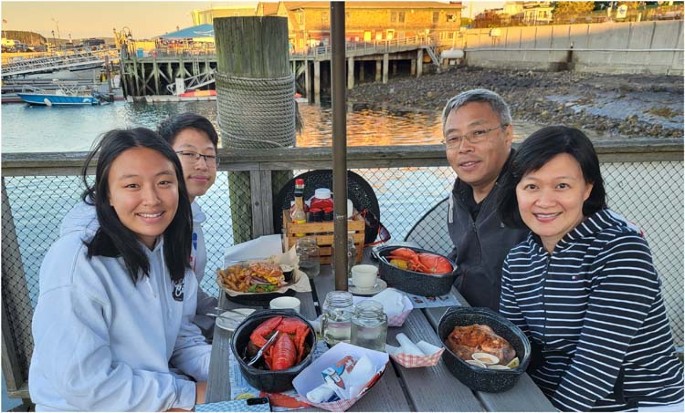
- Select a language for the TTS:
- UK English Female
- UK English Male
- US English Female
- US English Male
- Australian Female
- Australian Male
- Language selected: (auto detect) - EN
Play all audios:
You have full access to this article via your institution. Download PDF I came to America from Indonesia to pursue undergraduate and graduate studies. After getting my master’s degree in
psychology, I worked as a case manager in a foster care system and encountered many children affected by the opioid epidemic. This experience inspired me to pursue a medical career. I
underwent a post-baccalaureate premedical study at Columbia University, then received an MD degree from Rutgers (then known as Robert Wood Johnson Medical School—University of Medicine and
Dentistry in New Jersey). I completed my Pediatric Residency and Neonatal-Perinatal Medicine Fellowship at the same institution. There I found my passion for a physician-scientist career.
With my family, Summer 2022 With this career goal in mind and the tremendous support of my husband and children, we moved to Massachusetts after my fellowship. I joined Tufts Medical Center
because of its robust research infrastructure. As a neonatologist caring for infants exposed to prenatal opioids, I discovered my research focus: to understand the
molecular-structural-behavioral impact of prenatal opioid exposure. Under the mentorship of Dr. Jill Maron (then the Executive Director of Mother Infant Research Institute at Tufts, now the
Pediatrician-in-Chief at Women & Infants Hospital in Rhode Island) and Dr. Jonathan Davis (Newborn Medicine Division Chief and Tufts CTSI Associate Director), we carved out a competitive
research strategy that led to several pilot and career development research awards. The K12 Building Interdisciplinary Research Career in Women’s Health and Charles H. Hood Foundation Award
funded our novel research using neonatal saliva and brain imaging to study the sex-specific and pro-inflammatory effects of prenatal opioids on the developing brain, particularly in reward
signaling and feeding regulation, and long-term growth and neurodevelopmental outcomes. My advice to my fellow early-career investigators is to be persistent and stay inspired. Have the grit
and the courage to explore novel areas that are scientifically sound. Seek mentorship, sponsorship, and a network of people who support us with honesty and integrity. Most importantly,
remain passionate and focused on why we chose our career path in the first place: to advance pediatric research, improve treatment options, and provide the best pediatric care. All these
essential ingredients are key to our success in mentoring and paving the way for others in the future. AUTHOR INFORMATION AUTHORS AND AFFILIATIONS * Mother Infant Research Institute (MIRI),
Tufts Medical Center, Boston, MA, USA Elizabeth Yen * Department of Pediatrics, Tufts Medical Center, Boston, MA, USA Elizabeth Yen Authors * Elizabeth Yen View author publications You can
also search for this author inPubMed Google Scholar CORRESPONDING AUTHOR Correspondence to Elizabeth Yen. ETHICS DECLARATIONS COMPETING INTERESTS The author declares no competing interests.
RIGHTS AND PERMISSIONS Reprints and permissions ABOUT THIS ARTICLE CITE THIS ARTICLE Yen, E. Early career investigator biocommentary: Elizabeth Yen. _Pediatr Res_ 93, 465 (2023).
https://doi.org/10.1038/s41390-022-02406-z Download citation * Received: 08 November 2022 * Accepted: 09 November 2022 * Published: 29 November 2022 * Issue Date: February 2023 * DOI:
https://doi.org/10.1038/s41390-022-02406-z SHARE THIS ARTICLE Anyone you share the following link with will be able to read this content: Get shareable link Sorry, a shareable link is not
currently available for this article. Copy to clipboard Provided by the Springer Nature SharedIt content-sharing initiative









